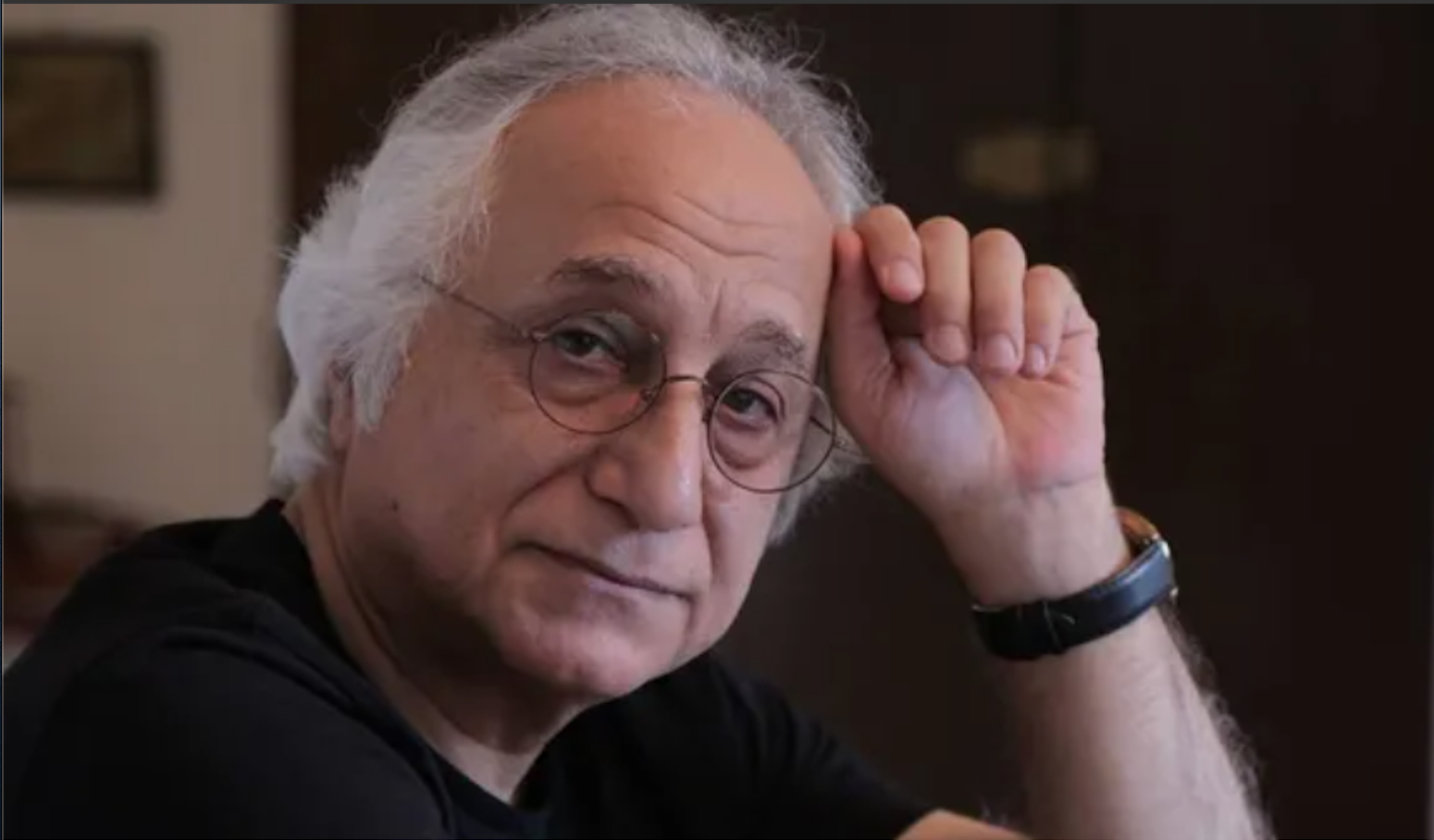BIO
Shams Langeroodi (b. 1951) is an Iranian trailblazer whose six-decade-long artistic journey has exemplified the power of human resilience, transcending boundaries and overcoming numerous challenges. His extensive body of work—spanning poetry, literary research, novel writing, songwriting, singing, and acting in both cinema and theater—has made him one of the most celebrated poets for Farsi speakers worldwide, despite the unique challenges faced by artists in Iran.
Born and raised in Langerood, a city nestled near the Caspian Sea in northern Iran, Shams Langeroodi’s early years were profoundly influenced by the natural beauty of his surroundings— the untamed sea, the enchanting forests, and the life-affirming rain. His father, a distinguished scholar of classical literature and poetry, also played a key role in shaping Langeroodi’s intellectual and artistic development. A tragic childhood illness that confined him to bed for several years became a transformative period, allowing his imagination to flourish and his poetic instincts to take root.
With a background in mathematics and a bachelor’s degree in economics from Rasht University, Langeroodi came of age during a transformative time in Iran's history, a period marked by the shift from tradition to modernism. Influenced by the counterculture of the 1970s and drawn to socialist ideals, he integrated surrealism into his poetry as a response to the socio-political climate. Despite the suppression of intellectual pursuits and artistic expression following the 1979 Revolution, Langeroodi persistently challenged the prevailing system. Over the past forty-six years, he has weathered political imprisonment and censorship, using his artistic talents to contribute to the cultural and intellectual landscape of Iran.
Langeroodi’s poetic career began with the publication of his first poetry collection, Thirsty Behavior (1976), and was followed by In the Moonlight of the World (1984). Between these two volumes, he faced significant hardships, including being expelled from his job at the Center for the Nurture of Children and Teenagers and being imprisoned for his political activities and intellectual beliefs. While incarcerated, he taught the history of classical Iranian literature to his fellow prisoners. After his release, Langeroodi continued his literary studies and published his third book, Ashes and the Lady (1986), an epic monologue by a mother mourning the loss of her son.
His literary research also flourished during this time, with works such as Twister of Insanity Excitement (1987), which explored the literature of 10th- to 12th-century Iran, and Indian Style (1989), which focused on 13th-century Persian literature. Perhaps his most significant contribution to Iranian literary history is An Analytical History of Modern Iranian Poems, a four-volume, comprehensive study of modern Persian poetry from the Constitutional Revolution of 1905 to the Islamic Revolution of 1979. The first volume was published in 1991, but the subsequent three volumes faced seven years of censorship before being fully released in 1998. This work remains a cornerstone of Persian literary studies and is used in university courses around the world.
In addition to his literary research, Langeroodi has published over twenty poetry collections, including Invisible Celebration (1988), A Narrative of the Fractured Smile (1990), The Musical Notes for Wooden Nightingale (2000), Fifty-Three Love Songs (2004), The Gardener of Hell (2004), The Sailor of Streets (2008), and Dancing with a Fake Passport (2023). His poetry reflects his personal experiences and engages with larger socio-political themes, including his reflections on the 2009 Iranian protests in Twenty-Two Elegies in the Month of Bollate (2009). Drawing Your Hands (2010); I Shall Dye for the Crime of Still Being Alive (2010); And Strangely They Call Me Shams (2013); Night Is a Public Mask (2013); The Songs of a Wingless Angle (2013); The Balance of the Day on My Fingers (2013); The Sonnet of Return (2014); The Words Came to See Me (2016); The Book of Music: Poems in Appreciation of Instruments (2018); The White Train (2021); and Dancing with a Fake Passport (2023).
In addition to his poetry, Langeroodi has authored three novels—March on Hollow Land (1991), Those Who Came to My Home (2015), and I Am Going to Reach the Concert (2025)—and several children's books, including The Night Maryam Was Lost (1999), Rumi and Boomy (2011), and The Story of Sewing Machine (2013). His scholarly work includes books such as The Devotee Reaches the Desire (2001), about the life and works of Nima Youshij, the founder of modern Persian poetry, and A Day It Snows Red (2010), a study of Persian poetic form.
Langeroodi’s deep engagement with the work of Hafez, Iran’s most beloved classical poet, has also led to two important books: And Nothing, Except My Dear Life: My Understanding of Hafez Perception (has not been allowed to be published), and Divan Hafez (2025). These works aim to challenge the recent reinterpretations of Hafez’s poetry that have sought to present him as a religious figure, asserting instead a more nuanced understanding of Hafez’s profound insights into life, love, and spirituality.
Throughout his prolific career, Langeroodi’s artistic contributions have extended beyond poetry and literary studies. His musical collaborations and songwriting have resulted in five original albums, numerous songs, and performances with renowned Iranian and Iranian-American musicians. His recent concert performances, based on his poetry, have been met with wide acclaim, while his acting credits include roles in six films. Langeroodi's work has offered solace and inspiration to countless individuals facing political and social turmoil, offering a voice of resilience and beauty in the face of adversity.
Langeroodi’s legacy is one of enduring creativity, intellectual rigor, and artistic innovation. His work continues to inspire and resonate with audiences around the world, solidifying his place as a towering figure in modern Persian literature and culture.

